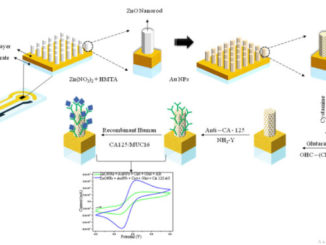
ZnO nanorods-gold nanoparticle-based biosensor for detecting hepatitis C
Abstract: ZnO nanorods comprised of biosensors with Au nanoparticles are described in this study for detecting Hepatitis C virus (HCV). The biosensor device was constructed on a glass substrate with silver and gold electrodes. The ZnO nanorods were grown by microwave hydrothermal synthesis, and the Au nanoparticles were deposited by the sputtering method. The Au nanoparticles were deposited because of the right efficient of anti-HCV antibodies with cystamine and glutaraldehyde. The ZnO nanorods were evaluated using SEM images. The electrochemical biosensor shows a sensitive response to HCV with a detection limit of 0.25 mu g/mu L. The proposed sensor characteristics of high specificity, good reproducibility and remarkable stability will provide a sensitive, selective, and convenient approach for the detection of HCV.
Author(s): Biasotto, G ; Costa, JPC ; Costa, PI ; Zaghete, MA
APPLIED PHYSICS A-MATERIALS SCIENCE & PROCESSING
Volume: 125 Pages: 07 Published: DEC 2019
DOI: 10.1007/s00339-019-3128-1


